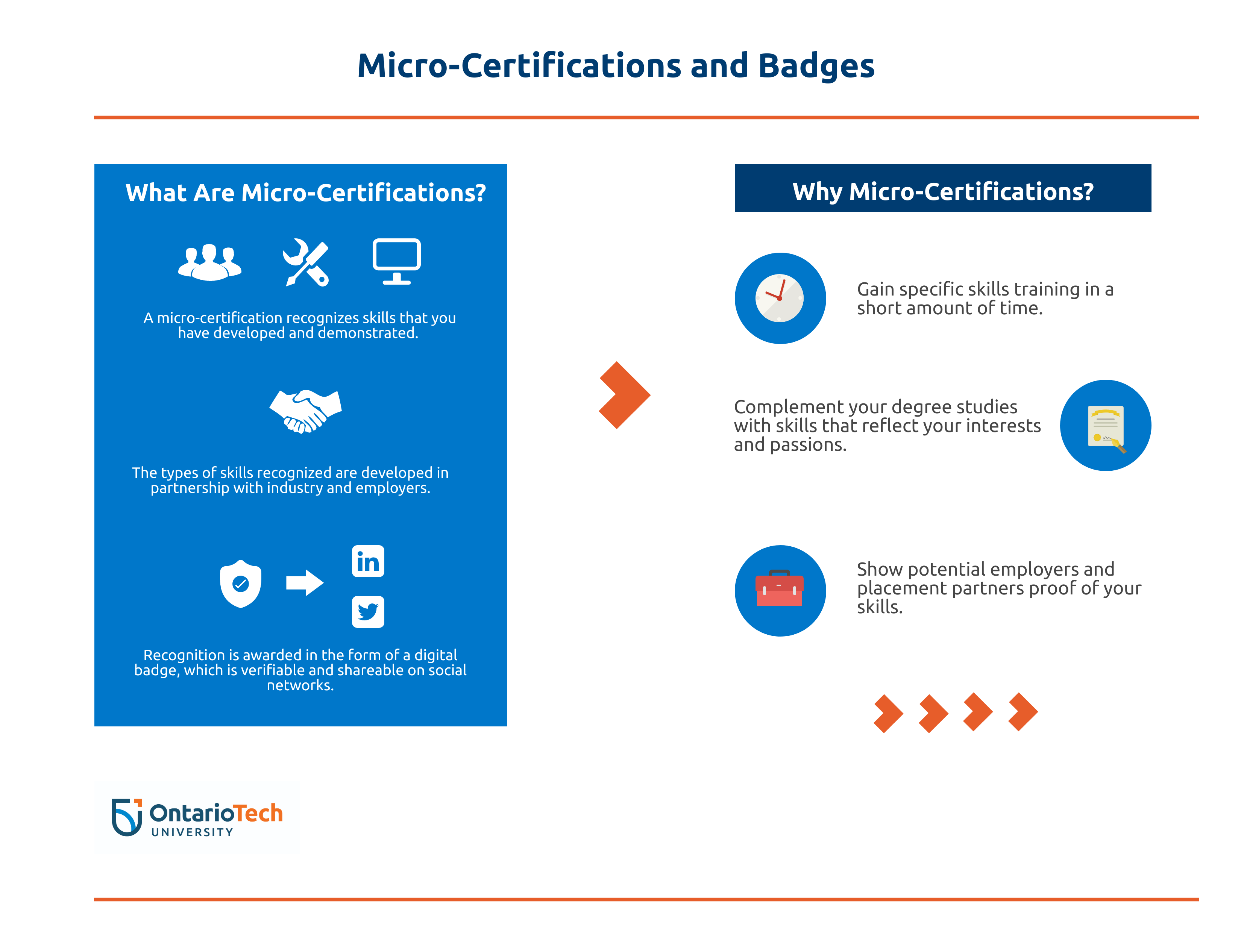Definitions

-
What are micro-certifications?
Micro-Certifications are the recognition of a (small) specific skill set based on approved criteria for assessment with input from industry. It is a portable, consistent, clear communication tool that represents documented evidence of skills that can transfer across contexts and is implemented with sufficient credibility of official recognition and value. The digital representation of this achievement is a badge or digital badge.
At the essential level, a micro-certification is/can:
- Be given in recognition of assessed skills. A micro-certification is not given for participation or simple attendance at a learning experience.
- Assess both technical knowledge and conceptual knowledge.
- Be cross-disciplinary, while some are context- or discipline-specific.
A micro-certification is not:
- A replacement for traditional credentials like degrees or diplomas. It can be used as a symbolic representation, however, but only after necessary governance and approval and gives context to a traditional transcript.
- Representative of course standing or other in-course ranking (gamification).
- A micro-learning experience (see definition which follows).
Micro-Credential is another term for micro-certifications but should not be widely used due to confusion regarding other credentials.
-
What are badges?
The digital representation of an achieved micro-certification is a badge or digital badge.
-
What is a micro-learning experience?
Micro-certifications are different from micro-learning experiences. A micro-learning experience is any learning opportunity that is non-traditional in nature. That is, it does not fit in with the traditional 13-week, 3 semester structure of a typical degree program. A micro-certification may recognize learning obtained from a particular experience, it may not, or both. Micro-learning experiences are:
- An alternative learning activity or experience which is flexible, innovative, and approved through governance channels and is assessed via formally accepted standards.
- Delivered in ways that differ from traditional, for-credit degree components (courses) with different timing.
- Inclusive of workshops, hackathons, bootcamps, nanodegrees, micro masters, or short courses.
- Used as credit recognition toward a higher-level credential (stacking) when governance and planning channels are followed.
- Designed with the potential recognized via a digital token or badge, or a more traditional form of recognition.
-
What is a passport or backpack?
A badge passport or backpack is an online platform that allows users to store, view, and share their earned badges. Because badges, passports, and backpacks are built using the Open Badges Framework, users can choose any platform to host their badges, regardless of where they were earned.
-
How do micro-certifications fit in at Ontario Tech?
In order to provide learners with flexible opportunities to validate and enhance their skills, knowledge, and experience, Ontario Tech is working on a strategy to incorporate micro-certifications into its offerings at the academic, co-curricular, and continuous learning levels. Badges recognize learning achieved through traditional, micro, and other learning experiences. Micro-certifications or badges do not replace any learning experience at any level.
Through consultation with faculty, staff, students, and industry groups, as well as a Provincial Working Group, Ontario Tech will develop tools, processes, procedures, and policies to assist its community in creating and delivering high-quality, valuable badges. -
What are the criteria by which micro-certifications are developed?
Principles
Micro-Certifications follow best practices and principles established by provincial working groups or other ministerial guidelines.
- Micro-certifications are academically governed and approved, and represent high academic quality and oversight.
- Micro-certifications must be developed, and approved according to campus policies and procedures, consistent with the Institution’s mission and strategic goals.
- Industry connections and partnerships form the foundation of micro-certifications and can provide opportunities for Industry/education connections and partnerships. They should be informed by current data and designed to meet market needs.
- Micro-certifications provide earners, industry, and the institution with flexible and innovative opportunities to demand, teach, and demonstrate Transfer-Ready Skills, mastery, knowledge, and attitudes.
- Micro-Certifications have value to earners and industry partners outside of the institution.
- Once Issued, the earner retains ownership of the micro-certification and associated metadata, unless the micro-eertification expires or is revoked.
- Micro-certifications should designed to be stackable in the future when additional policies and procedures have been developed.
Key Value Criteria
- Institution: The Micro-Certification must represent and build upon the university’s practices, values, goals, and brand.
- Industry: The Micro-Certification must be a valuable indicator of transfer-ready skills as validated by Industry/employers.
- Earner: The Micro-Certification focuses on articulable competencies that benefit and celebrate the Earner.
Implementation Criteria
- Feasibility: The Micro-Certification is feasible to create, earn, assess, issue, and verify for all stakeholders.
- Credibility: The Micro-Certification recognizes transferrable/transfer-ready skills in a rigorous, consistent, and transparent manner that is validated by Industry.
- Wayfinding: The Micro-Certification facilitates a pathway to continued learning and engagement.
- Usefulness: The Micro-Certification reflects the needs of Industry in a timely manner, allowing for articulation of transfer-ready skills.
